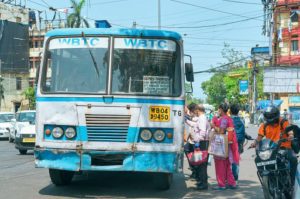Free Bus Rides for Women: A recent study by Nikore Associates for the Sustainable Mobility Network has revealed that introducing free bus rides for women in Kolkata could increase the number of female bus commuters by nearly 28%. The study, part of a broader analysis across ten Indian cities, underscores the far-reaching implications such a scheme could have on gender-inclusive public transport, safety, and economic empowerment.

Key Findings from the Study
According to the study, 44.5% of women in Kolkata already use buses for their daily commute. If bus fares were waived, an additional 27.8% of women said they would switch to using buses. The research, titled “Beyond Free Rides: A Multi-State Assessment of Women’s Bus Fare Subsidy Schemes,” also showed a 22.5% expected increase in bus travel for education or employment purposes.
In Durgapur, another major city in West Bengal included in the survey, 25% of women stated they would shift to buses if the rides were free. Moreover, 13% said they would use buses more frequently for non-essential travel like visiting relatives, markets, or parks.
Addressing Core Barriers
Women across India often rely on walking or informal transport due to the unaffordability of regular commuting. Many spend over 25% of their income on transportation. The proposed free fare scheme could enable women, especially from lower-income groups, to save money and reallocate it to healthcare, children’s education, or household needs.
The report also noted that safety concerns discourage women from using buses. Issues like poor lighting at bus stops, overcrowded vehicles, and harassment are common deterrents. The authors recommend that any fare-free scheme should be paired with improvements in bus frequency, cleanliness, female-only seating, and surveillance systems.
Successful Models from Other States
Delhi’s Pink Ticket scheme and Karnataka’s Shakti Yojana serve as relevant precedents. Delhi launched free bus rides for women in 2019, and Karnataka followed with its state-wide Shakti scheme in 2023. These initiatives have led to increases in female ridership while highlighting implementation challenges such as identity verification, crowd management, and funding support.
West Bengal also introduced “Ladies Special” buses in mid-2024, featuring women drivers and conductors. While the fleet remains limited, public reception was largely positive. However, the pilot lacked the scale and data analytics needed for long-term planning.
Policy Recommendations for West Bengal
To successfully implement a fare-free scheme, the study outlines several key steps:
- Smart Card Distribution: Provide ID-linked transport cards to eligible women.
- Fleet Expansion: Increase the number of buses, particularly during peak hours.
- Safety Measures: Install CCTV, deploy trained staff, and reserve seating.
- Public Awareness Campaigns: Promote the scheme across media channels.
- Monitoring & Evaluation: Regular surveys and digital tracking should be used to assess effectiveness and make adjustments.
Economic and Social Impact
The financial cost of free rides could be offset by the social benefits they bring. Improved mobility helps women access better jobs, education, and healthcare. Additionally, increased female visibility in public spaces contributes to normalizing their presence and can lead to safer streets.
Critics argue that such schemes might reduce bus availability for male passengers or strain already underfunded transport systems. However, experts maintain that a well-structured scheme with adequate funding and policy support can benefit all commuters through reduced congestion and improved service quality.
Conclusion
With Kolkata’s dense population and growing gender equity needs, the time may be ripe for West Bengal to adopt a forward-thinking public transport policy. As state authorities evaluate options, evidence from this new study could become a critical component in shaping a more inclusive and accessible urban mobility network.
External References:
- NITI Aayog: Gender and Mobility in Urban India
- Sustainable Mobility Network
- Government of Karnataka: Shakti Scheme
- Delhi Transport Corporation
Also read: Home | Channel 6 Network – Latest News, Breaking Updates: Politics, Business, Tech & More

